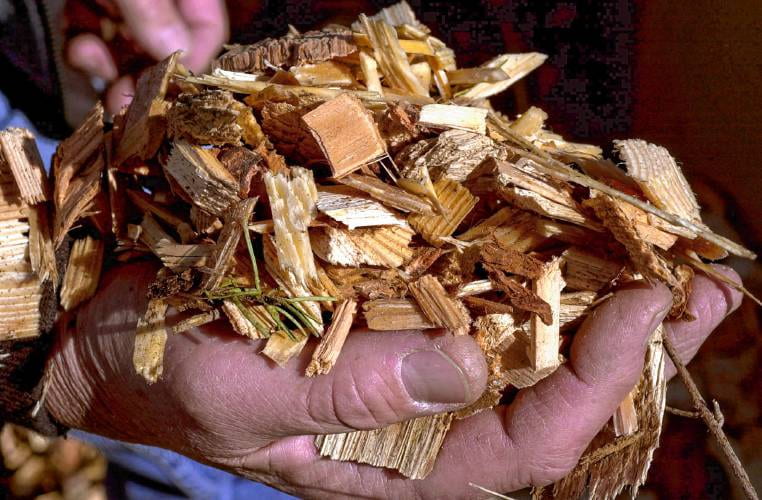Burning trees might not seem like the answer to climate change, but in New Hampshire it just might be part of the solution. Biomass power plants burn plant material of any kind to produce energy. In New Hampshire’s case, these power plants are burning wood chips and other scrap wood, thus creating a market for low-grade timber. Governor Sununu’s policy decisions have long been opposed to biomass despite its benefits to the local timber industry.
Whether it is the vivid fall foliage or the verdant green of summer that comes to mind, forests are New Hampshire’s defining feature. And like the rest of our planet, these forests are threatened by climate change.

View from Pitcher Mountain in Temple, NH. Photo taken by author.
Addressing this threat will require unprecedented collaboration and communication about our forest resources.
To make matters complicated, New Hampshire’s forests are 70 percent privately owned. 128,000 private landowners control the forests of this beautiful state. Any climate solutions will require convincing numerous individual actors.
Climate change activists and many scientists argue that building more biomass plants could increase demand for biomass, thus encouraging landowners to increase their cutting practices. And to be sure, the last thing we need is widespread deforestation. In NH, forests offset roughly 38 percent of the state’s total carbon dioxide emissions. But small-scale sustainable timber harvesting does not necessarily mean deforestation or even a net loss of carbon storage.
A recent paper by Jevon et al. comparing two forest sites with different logging histories found no difference in the carbon storage capacity. Although additional harvesting has the potential to change where the carbon is stored in a forest, deep in the soil or high in the canopy, forests do not stop providing carbon storage. Matthew Ayres, the study’s co-author and a professor of biological sciences at Dartmouth said, “This study shows that our northeastern forests can provide sustainable products such as lumber, pulp and fuel while still serving as reservoirs for lots of carbon, but the details depend on how forests are managed, and we need to keep getting better at that.”
New Hampshire must improve dialogue between policymakers and landowners to clarify what measures should be met to maintain land as forest.
Closing current biomass plants has the potential to shutter the state’s local timber industry. Biomass may not be the climate solution for New Hampshire, but we cannot discount it from the conversation entirely. In an interview with New Hampshire Public Radio, local tree farmer Tom Thomson said “There is no way, without the biomass, that we can manage [forests] sustainably. So instead of growing trees, I will be growing house lots. And I will invite you up when I put the sign up.” A recent draft report showed that most private landowners see biomass plants as critical to maintaining the state’s timber industry. If they have nowhere to sell low-grade wood, it is hard to turn a profit.
The NH Timberland Owners Association and other local landowners have heavily criticized Governor Sununu’s positions on biomass for this reason. In 2019, Governor Sununu vetoed Bill 183, a law that would have subsidized the state’s six current biomass power plants, allowing the plants to stay open. Since then, two of the state’s biomass power plants have closed while two others have greatly reduced operations. This jeopardizes NH’s local timber operations and threatens the thousand or so biomass jobs, as well as countless others in the logging, trucking, and equipment industries.
New Hampshire trails the region in our climate change response. Although Governor Sununu has publicly acknowledged that climate change can be attributed to human causes (a change from his 2017 outright denial), he has stalled nearly all clean energy efforts in New Hampshire. In addition to saving the state’s current biomass power plants, Bill 183 would have ensured power companies bought renewable energy credits from the biomass plants in their operating regions. Sununu’s veto exemplifies his disregard for climate change and predilection for siding with large business interests over communities. His main argument against the bill was its potential to drive up consumer energy costs, but his economic calculations ignore the avoided costs of having local electricity (line losses, or reduced transmission capacity) as well as any new costs as a result of regional replacement needs as the state’s biomass plants go under.
Climate change is a complex issue and will require a complex solution. For New Hampshire, this could mean relying more on biomass plants as we transition away from fossil fuels. Although I don’t support biomass as a solution to climate change on a global scale, maintaining current biomass power plants in NH plays a crucial role in curbing deforestation.
